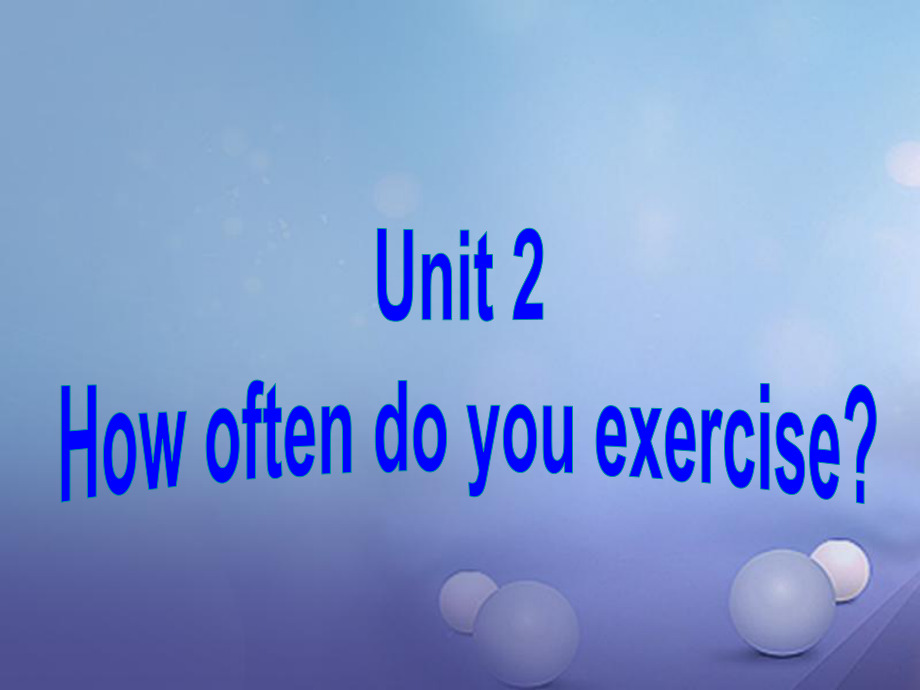《八年級(jí)英語(yǔ)上冊(cè) Unit 2 How often do you exercise(第3課時(shí))Section A(Grammar focus-3c) (新版)人教新目標(biāo)版》由會(huì)員分享����,可在線閱讀,更多相關(guān)《八年級(jí)英語(yǔ)上冊(cè) Unit 2 How often do you exercise(第3課時(shí))Section A(Grammar focus-3c) (新版)人教新目標(biāo)版(35頁(yè)珍藏版)》請(qǐng)?jiān)谘b配圖網(wǎng)上搜索��。
1�����、一、功能:Talk about how often you do things.二�����、詞匯及常用表達(dá)法:1.Learn to use“always,usually,often,sometimes,hardly ever,never”2.Learn to express frequency times.三��、語(yǔ)法:1.Ask for activity frequencies using“how often”questions.2.State the frequencies of the things you do using the adverbs of frequency and frequenc
2�、y time.Teaching and learning Goals What do you usually do on weekends?watch TVgo shopping do some readinggo swimminggo to the moviesplay basketball Let Ss translate the phrases or the sentences into English.1.你在周末通常做什么��?2.我總是鍛煉���。3.她在周末通常做什么��?4.她經(jīng)常幫助做家務(wù)��。5.你多久看一次電影?6.我去看電影一個(gè)月一次����。7.他多久看一次電視?8.他幾乎不看電視����。SUN M
3�、ON TUE WED THU FRI SAT2012 NOV 1 2 3 4 5 6 7 8 9 10 11 12 13 14 15 16 17 18 19 20 21 22 23 24 25 26 27 28 29 30 do you exercise?I exerciseSUN MON TUE WED THU FRI SAT2012 NOV 1 2 3 4 5 6 7 8 9 10 11 12 13 14 15 16 17 18 19 20 21 22 23 24 25 26 27 28 29 30 do you go skateboarding?SUN MON TUE WED THU F
4�����、RI SAT2012 NOV 1 2 3 4 5 6 7 8 9 10 11 12 13 14 15 16 17 18 19 20 21 22 23 24 25 26 27 28 29 30 do you watch TV?BackI usually play the guitar on weekends.I sometimes play the guitar on weekends.I always play the guitar on weekends.比一比�,看誰(shuí)說(shuō)得又快又好?比一比��,看誰(shuí)說(shuō)得又快又好���?100%80%20%I sometimes exercise on weekends.
5����、I hardly ever exercise on weekends.I never exercise on weekends.20%0%5%The difference of the frenquency words(頻率副詞頻率副詞)�。always(100%)usually(80%)often(30-50%)sometimes(20%)hardly ever(5%)never(0%)1.你通常在周未做什么?你通常在周未做什么����?_ _ you _ do on weekends?2.我總是去運(yùn)動(dòng)。我總是去運(yùn)動(dòng)�。I _ _.3.他們?cè)谥芪醋鍪裁矗克麄冊(cè)谥芪醋鍪裁?��?_ _ they _ on we
6�、ekends?usuallyWhat do always exerciseWhat dodo根據(jù)課本內(nèi)容,完成下列句子��。根據(jù)課本內(nèi)容�����,完成下列句子�。4.他們經(jīng)常幫助做家務(wù)。他們經(jīng)常幫助做家務(wù)�。They _ _ with housework.5.她在周未做什么?她在周未做什么�����?What _ she _ on weekends?6.她有時(shí)候去購(gòu)物��。她有時(shí)候去購(gòu)物���。She _ _ _.often helpdoes do sometimes goes shopping7.你多久去看電影一次���?你多久去看電影一次�����?_ _ do you go to the _?8.我可能一個(gè)月去看一次。我可能一個(gè)月去看一次
7����、。I go to movies _ _ a _.9.他多久看一次電視他多久看一次電視?_ _ does he watch TV?10.他幾乎不看電視�����。他幾乎不看電視��。He _ _ watches TV.How often maybe once monthmovieshardly everHow often11.你去購(gòu)物嗎��?你去購(gòu)物嗎����?_ _ go shopping?12.不,我從不去購(gòu)物���。不��,我從不去購(gòu)物����。No,I _ _ shopping.Do younever go1.how often 意為意為“_”�,是用于����,是用于提問(wèn)表示提問(wèn)表示 _ 的特殊疑問(wèn)詞組�����。其答的特殊疑問(wèn)詞組����。其答語(yǔ)應(yīng)為表示
8、語(yǔ)應(yīng)為表示 _ 的副詞或副詞詞組�。的副詞或副詞詞組。句子的時(shí)態(tài)一般是句子的時(shí)態(tài)一般是_��,也��,也可以是一般過(guò)去時(shí)�。可以是一般過(guò)去時(shí)���。多久一次多久一次對(duì)頻率提問(wèn)對(duì)頻率提問(wèn) 頻率頻率頻率頻率一般現(xiàn)在時(shí)態(tài)一般現(xiàn)在時(shí)態(tài)翻譯:翻譯:你多久去游泳一次��?一個(gè)星期三次�����。你多久去游泳一次����?一個(gè)星期三次����。Three times a week.How often do you go swimming?2.在一般現(xiàn)在時(shí)的一般疑問(wèn)句中,當(dāng)主語(yǔ)在一般現(xiàn)在時(shí)的一般疑問(wèn)句中����,當(dāng)主語(yǔ)為第三人稱(chēng)單數(shù)或復(fù)數(shù)時(shí),需要句子前為第三人稱(chēng)單數(shù)或復(fù)數(shù)時(shí)��,需要句子前加助動(dòng)詞加助動(dòng)詞Does或或Do�。e.g.他們通常在周未鍛煉嗎?他們通常在周未鍛
9��、煉嗎���?_ they often _ on weekends?她一周上網(wǎng)二次嗎��?她一周上網(wǎng)二次嗎���?_ she _ the Internet twice a week?Do exerciseDoes use3aComplete the questions with do or does.Then match the questions and answers.1.How often _ he play soccer?2._ you drink milk?3.How often _ they stay up late?4._ Sue eat a healthy breakfast?5.How oft
10�����、en _ you eat apples?6._ your parents play cards?doesdoDoDoesDodoa.Yes.She usually does.b.Hardly ever.I dont like them.c.He plays at least twice a week.d.No,they dont.Theyre too busy.e.Never.They always go to bed early.f.Yes,I do.Every day.答案:答案:1.c 2.f 3.e 4.a 5.b 6.d 1.maybe意為意為“大概����;或許��;可能大概����;或許;可能”�����,是
11�、副詞,常位于句首或句中是副詞����,常位于句首或句中。e.g.或許他們將去海灘度假����?�;蛟S他們將去海灘度假��。_ they are going to the beach for vacation.Maybe【辨析辨析】maybe與與may be maybe是副詞,在句子做狀語(yǔ)是副詞�,在句子做狀語(yǔ)。may be 是情態(tài)動(dòng)詞是情態(tài)動(dòng)詞may與動(dòng)詞原形與動(dòng)詞原形be一起構(gòu)成一起構(gòu)成句子的謂語(yǔ)動(dòng)詞意為句子的謂語(yǔ)動(dòng)詞意為“可能是可能是”��,它們����,它們有時(shí)也可互換。有時(shí)也可互換�。e.g.或許它們?cè)谀愕臅?shū)包里?����;蛟S它們?cè)谀愕臅?shū)包里�。_ they are in your schoolbag.They _ _ in you
12、r schoolbag.Maybemay be2.at least意為意為“至少����,不少于;起至少,不少于���;起碼碼”�,是副詞詞組����,一般指在數(shù)量,是副詞詞組��,一般指在數(shù)量或程度上或程度上�����。e.g.你必須至少一周打掃你的房間一你必須至少一周打掃你的房間一 次����。次。You have to clean your house _ _ once a week.at least Questions:1._?(how often/help with housework)2._?(what/usually/do/weekends)How often do you help with houseworkWhat d
13���、o you usually do on weekendsUse the words given to write questions.Then ask and answer them with a partner.3b3._?(how often/best friend/exercise)4._?(what/usually/do/after school)How often does your best friend exerciseWhat do you usually do after schoolWhat can you do to improve your English?Add mo
14�、re things to the chart.Then ask your classmates the questions and find the best English student.3cWhat can you do to improve your English?How often do youNamesFrequencyread English books?Lin Yingtwice a weekHow often do youNamesFrequencyread English books?Lin Yingtwice a weekwrite to a pen friendwat
15�����、ch English moviesgo to English clubSu LeiHu Taoonce a weekHu TaoMa Litwice a weekKeep an English diaryonce a daytwice a monthLin Ying reads English books twice a week.Hu Tao goes to English Club twice a week.Su Lei watches English movies once a week.Ma Li writes to a pen friend twice a month.Hu Tao
16、keeps an English diary every day.I think Hu Tao is the best English student.Like this:一�、用括號(hào)內(nèi)所給單詞的適當(dāng)形式填空用括號(hào)內(nèi)所給單詞的適當(dāng)形式填空1.Mary goes _(shop)four times a month.2.He works hard and _(hard)ever watches TV.3.Li Lei likes football and he plays at least three _(time)a week.4.Do you often go to the movies?No,
17、only _(one)a month.5.My best friend Tom usually _(exercise)for an hour a day.二��、翻譯下面的句子����。二、翻譯下面的句子����。1.我?guī)缀鯊牟豢措娪啊?.你多久幫媽媽做一次家務(wù)�����?至少一周一次�。3.他經(jīng)常熬夜嗎?不��,或許一個(gè)月一兩次吧�����。1.(You Must)Copy and remember the sentences in the Grammar Focus.2.(If You Can)Writing Write an article to introduce(介紹)your and your best friends free time activity frequencies.要求:(1)運(yùn)用一般現(xiàn)在時(shí)和頻度副詞 (2)語(yǔ)句通順�����,格式正確 (3)字?jǐn)?shù)不少于60記住好好鍛記住好好鍛煉身體喲!煉身體喲����!
 八年級(jí)英語(yǔ)上冊(cè) Unit 2 How often do you exercise(第3課時(shí))Section A(Grammar focus-3c) (新版)人教新目標(biāo)版
八年級(jí)英語(yǔ)上冊(cè) Unit 2 How often do you exercise(第3課時(shí))Section A(Grammar focus-3c) (新版)人教新目標(biāo)版

